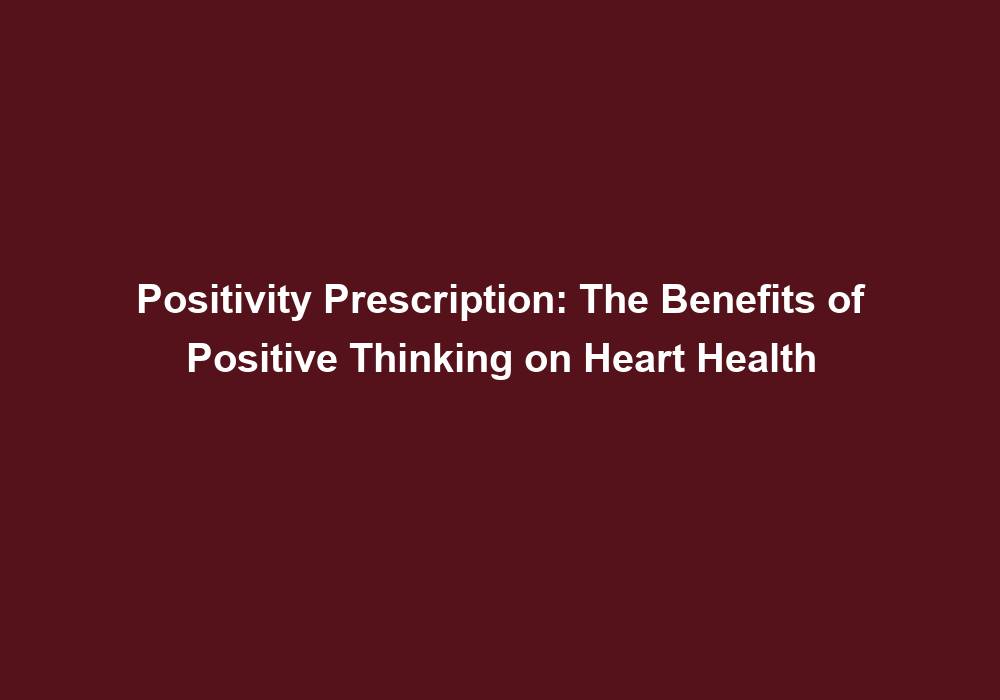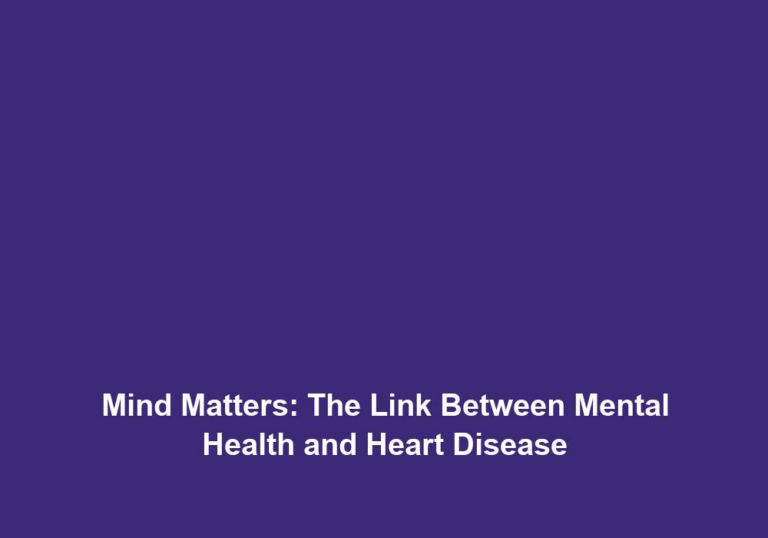Positivity Prescription: The Benefits of Positive Thinking on Heart Health
In today’s fast-paced and stressful world, maintaining a positive mindset has become increasingly important for overall well-being. While many people associate positive thinking with mental health benefits, it may surprise you to learn that positive thinking can also have a profound impact on your heart health. In this article, we will explore the various ways in which cultivating a positive mindset can contribute to a healthier heart.
The Mind-Heart Connection
Before delving into the benefits of positive thinking on heart health, let’s first understand the mind-heart connection. The mind and the heart are intricately linked, forming a powerful duo that influences our overall health and well-being. Research has shown that our thoughts, emotions, and attitudes can significantly impact our cardiovascular system.
The mind-heart connection is a complex interplay between our thoughts and emotions, and it directly affects our heart health. When we experience negative emotions like stress, anxiety, and anger, our bodies release stress hormones like cortisol and adrenaline. These hormones can increase blood pressure, constrict blood vessels, and promote inflammation in the body. On the other hand, positive emotions such as joy, gratitude, and optimism have the opposite effect. They trigger the release of endorphins and other feel-good chemicals, which can relax blood vessels, lower blood pressure, and reduce inflammation.
Cultivating a positive mindset helps create a favorable environment for the heart and cardiovascular system. By consciously choosing positive thoughts and emotions, we can improve heart health and overall well-being.
Reducing Stress and Anxiety
One of the primary ways in which positive thinking improves heart health is by reducing stress and anxiety levels. Chronic stress and anxiety can take a toll on the body, leading to increased blood pressure, inflammation, and an elevated risk of heart disease. By embracing positivity, individuals can counteract these negative effects by promoting a sense of calmness, relaxation, and inner peace.
Tips for Reducing Stress through Positive Thinking:
- Practice mindfulness meditation daily to promote relaxation and reduce stress. Focus on your breath, observe your thoughts without judgment, and cultivate a state of present-moment awareness.
- Engage in activities that bring you joy and relaxation, such as listening to music, spending time in nature, or practicing yoga. These activities can help shift your focus away from stressors and promote a positive mindset.
- Surround yourself with positive and supportive individuals who uplift your spirits. Building a strong support system can provide emotional resilience and help you navigate stressful situations with a positive outlook.
- Practice gratitude by keeping a journal of things you are thankful for each day. Focusing on the positive aspects of your life can shift your perspective and reduce stress.
- Focus on the present moment instead of dwelling on past regrets or worrying about the future. Mindfulness techniques such as deep breathing, progressive muscle relaxation, and visualization can help you stay grounded and reduce anxiety.
By incorporating these strategies into your daily routine, you can effectively reduce stress levels and improve heart health through positive thinking.
Boosting the Immune System
Did you know that positive thinking can give your immune system a significant boost? A strong immune system is crucial for maintaining heart health as it helps defend against various infections and reduces the risk of inflammation within the cardiovascular system. When we adopt a positive mindset, our bodies produce fewer stress hormones, which can suppress the immune system. This leads to increased immune function and a reduced risk of heart-related illnesses.
Positive emotions have been linked to enhanced immune system function. When we experience positive emotions, our bodies release neuropeptides that help regulate immune responses. These neuropeptides promote the production of immune cells, enhance their activity, and improve the body’s ability to fight off infections and inflammation.
Ways to Boost Your Immune System through Positive Thinking:
- Engage in regular physical exercise, which has been shown to enhance immune function and improve mood. Exercise stimulates the production of endorphins, which are natural mood boosters and immune system enhancers.
- Eat a well-balanced diet rich in fruits, vegetables, whole grains, and lean proteins, providing the necessary nutrients for a robust immune system. Antioxidant-rich foods like berries, leafy greens, and nuts can help protect against oxidative stress and support immune function.
- Laugh often, as laughter has been shown to stimulate the production of antibodies and boost the body’s natural defense mechanisms. Watch a funny movie, spend time with friends who make you laugh, or engage in activities that bring you joy.
- Get enough sleep each night, aiming for 7-9 hours of quality sleep, as sleep deprivation can weaken the immune system. During sleep, the body repairs and regenerates, and the immune system functions optimally.
By incorporating these practices into your lifestyle, you can harness the power of positive thinking to boost your immune system and protect your heart health.
Promoting Healthy Lifestyle Changes
Positive thinking can act as a catalyst for adopting and maintaining healthy lifestyle changes, which are crucial for heart health. When individuals have a positive outlook, they are more likely to engage in behaviors that promote cardiovascular well-being, such as regular exercise, a balanced diet, and avoiding harmful habits like smoking and excessive alcohol consumption.
A positive mindset provides the motivation and determination to make healthier choices and stick to them. It helps overcome barriers and setbacks, and fosters a proactive approach to one’s health. With a positive mindset, individuals are more likely to view exercise and healthy eating as enjoyable and rewarding, rather than as burdensome tasks.
Tips for Embracing Healthy Lifestyle Changes:
- Incorporate physical activity into your daily routine, aiming for at least 150 minutes of moderate-intensity exercise per week. Choose activities you enjoy, such as dancing, swimming, or hiking, to make exercise a fun and sustainable part of your life.
- Opt for heart-healthy foods, such as fruits, vegetables, whole grains, lean proteins, and healthy fats like avocados and nuts. Experiment with different recipes and flavors to make healthy eating exciting and satisfying.
- Limit your intake of processed foods, sugary drinks, and foods high in saturated and trans fats. These unhealthy choices can contribute to inflammation, high cholesterol levels, and an increased risk of heart disease.
- Avoid smoking and limit alcohol consumption to moderate levels, as excessive drinking can increase the risk of heart disease. Seek support from healthcare professionals or support groups if you need help quitting smoking or reducing alcohol consumption.
By embracing positive thinking, you can create a foundation for healthy lifestyle changes that promote heart health and overall well-being.
Enhancing Social Connections
Positive thinking can also enhance social connections, which play a vital role in maintaining heart health. Research suggests that individuals with strong social support systems have a lower risk of heart disease and better overall cardiovascular health. By cultivating a positive mindset, we are more likely to attract positive relationships, strengthen existing bonds, and build a supportive network, ultimately benefiting our heart health.
Positive thinking fosters an optimistic outlook on life, making it easier to connect with others and maintain healthy relationships. When we approach social interactions with positivity, we radiate warmth, kindness, and empathy, which can strengthen our connections with others. These positive relationships provide emotional support, reduce stress levels, and promote a sense of belonging, all of which contribute to better heart health.
Ways to Enhance Social Connections:
- Engage in activities that allow you to meet new people and form connections, such as joining clubs, volunteering, or participating in group fitness classes. These activities provide opportunities to interact with like-minded individuals and expand your social network.
- Prioritize spending quality time with loved ones, friends, and family. Plan activities together, have meaningful conversations, and create lasting memories. These moments of connection and support contribute to a healthier heart and overall well-being.
- Practice active listening and empathy when interacting with others, fostering deeper connections and understanding. Show genuine interest in others’ lives, validate their experiences, and offer support when needed. These simple acts of kindness can strengthen relationships and promote emotional well-being.
- Use technology and social media platforms to connect with like-minded individuals and engage in positive online communities. Join groups or forums related to your interests, share experiences, and support others on their journeys. These virtual connections can provide a sense of belonging and support, especially during challenging times.
By embracing positive thinking and nurturing social connections, you can create a heart-healthy environment that promotes overall well-being.
Conclusion
In conclusion, maintaining a positive mindset can have a significant impact on heart health. By reducing stress and anxiety, boosting the immune system, promoting healthy lifestyle changes, and enhancing social connections, positive thinking becomes a powerful prescription for a healthier heart. Embrace positivity, and witness the transformative effects it can have on your cardiovascular well-being. Start today, and let positive thinking be the catalyst for a healthier and happier heart.
Note: The above article is written in markdown format.







